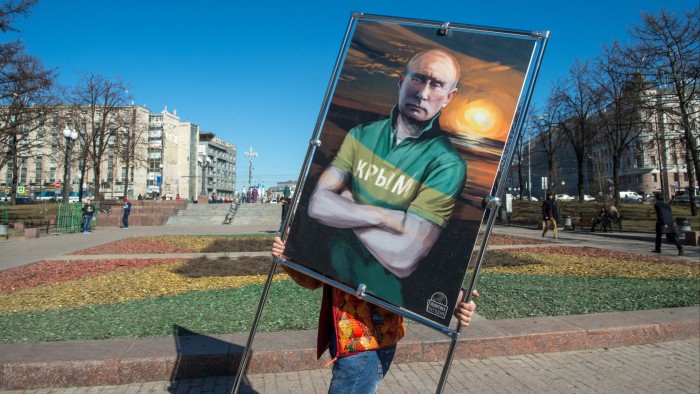Donald Trump’s insistence that Ukraine officially recognise Moscow’s annexation of Crimea under a peace deal with Russia has suddenly confronted European capitals with an agonising choice: stick with Kyiv or side with Washington.
Some European officials fear differences over the Trump administration’s one-sided draft accord will put bilateral relations with London, Berlin and other capitals to the test, undermine transatlantic security and potentially derail a Nato summit in late June.
The Europeans have always been “in a weak position to stand up to the US”, said Jeremy Shapiro, director of the US programme at the European Council on Foreign Relations. “They’ve been trying to avoid it for that reason.”
European hopes of being included in the US-led talks were dashed on Wednesday when US secretary of state Marco Rubio pulled out of a meeting in London with Ukrainian and European officials and Trump’s special envoy Steve Witkoff opted instead to make his fourth visit to the Kremlin.
The Trump administration has presented Kyiv with the outline of a take-it-or-leave-it deal, with terms highly favourable to Moscow — including US recognition of Russia’s sovereignty over Crimea 11 years after it annexed the Ukrainian peninsula in contravention of international law.
President Volodymyr Zelenskyy refused once again on Tuesday to recognise Russia’s sovereignty over any of the territory it has seized since 2014. Kyiv, however, is ready to live with de facto Russian control in return for western security guarantees.
On Wednesday Trump lashed out at Zelenskyy’s stance, calling it “very harmful” to his peace efforts and “inflammatory”.
“He can have Peace or, he can fight for another three years before losing the whole Country,” the US president wrote on Truth Social.
Washington’s offer to endorse Moscow’s control of Crimea, breaking with the agreed policy of Nato, is possibly the biggest concession it has made to Moscow in recent months in its haste to strike a deal.
The Trump administration has also ruled out Ukraine’s membership of Nato — a long-standing Russian objection to a Nato pledge to allow Kyiv into the alliance at a future point.
While Moscow has been lavished with inducements Kyiv has been subjected to pressure and threats. It has been offered little in exchange for giving up its territory.
“The worst case would be if [the US] cannot reach a deal between Ukraine and Russia, and this is all pushed on Ukraine. This is when Europe would have to choose [between Ukraine and the US],” said a senior EU diplomat.
Ukrainian officials said before Wednesday’s talks they were prepared to discuss other terms of Washington’s outline deal.
“Ukraine is ready to negotiate — but not to surrender,” said deputy prime minister Yulia Svyrydenko on X. “There will be no agreement that hands Russia the stronger foundations it needs to regroup and return with greater violence.”

Western officials told the FT that European capitals would not endorse any move by the US to recognise Crimea as Russian or pressure Kyiv to agree to it, and hold fast to a long-held position that they would not accept anything regarding Ukraine’s sovereignty that Zelenskyy opposed.
“Crimea is Ukraine,” EU foreign policy chief Kaja Kallas told French news agency AFP on Tuesday.
For Europeans, the idea of recognising Crimea’s annexation — the first land-grab by military force in Europe since 1945 — is anathema since it would eviscerate the rules-based order that has underpinned peace on the continent for generations.
“Crimea and future Nato membership aspirations are red lines for us,” said a second senior EU diplomat. “We can’t give them up.”
Even if the US acted unilaterally, it would reward Russian aggression and encourage Moscow to pursue its claims in Georgia and Moldova and menace other former Soviet countries such as the Baltic states that are both Nato and EU members.
The Trump administration had already been told that it would be impossible for European capitals to recognise Crimea as Russian, according to a senior European official. Nato’s biggest European powers needed to “discourage” Washington from doing that unilaterally, the official said.

The status of Crimea could create a major diplomatic crisis for Nato — whose stated position is never to recognise Russian control over the peninsula.
Prior to the US offer, Nato officials were trying to downplay internal rifts over Ukraine, insisting that the alliance’s annual leaders’ summit in The Hague would focus on defence spending, not the war, according to officials involved in the discussions.
But the proposed deal and the possibility that the US could abandon talks, blame Kyiv and normalise relations with Moscow — could lead to a bust-up among Nato leaders.
“The core issue for the summit is where we are on Ukraine,” said a senior western official.
Similar rifts are likely to widen also within the EU, in particular over what to do about the bloc’s economic sanctions imposed on Russia should Washington decide to go ahead and lift its restrictions.
“Things don’t look good at all,” said an EU official. Any move by the US to recognise Crimea as Russia or demand that European capitals ease sanctions on Moscow would “kill EU unity . . . [it’s] all looking messy.”
The 23 European capitals who are members of both the EU and Nato are trying to find compromises with the Trump administration on future US commitments to European security and a trade deal to avoid a full-blown tariff war that could severely affect their economies, and fear that Washington could use the issue as leverage in those discussions.
Shapiro, of the ECFR, was sceptical about the ability of the EU to stay united.
“If the Americans walk away, it is just not going to be possible for the European to be unified on Ukraine. The Americans have been the source of unity on Ukraine.”
Additional reporting by Christopher Miller
Source link










